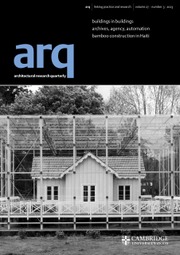No CrossRef data available.
Article contents
Spaces of the political
Published online by Cambridge University Press: 09 March 2018
Extract
This is a paper about the architecture of a concept: the concept of the political. Through the built environment, we come to re-imagine the concept of the political not as a set of institutions, or as an array of governmental forms, or even a series of rational choices, but in terms of affective energy flows. It is in interrogating this that I will turn to the built environment and analyse two ways of regulating the cadence of affective flows in relation to the political, through two machines: Britain's nineteenth century Crystal Palace and the Landlord Manor House Museum of Liu Wencai.
If Liu Wencai's Manor House Museum turned affective energy flows into political intensities that could drive the Maoist revolution, the Crystal Palace dissipated these same energy flows by turning them into commodity desires that would drive market growth. With the Crystal Palace, our attention is focused on how the channelling of energy into dissipated market desires produced a dispersal that, in turn, contributed to a political quietism. Such political quietism appeared as, at best, a ‘side-effect’ of an economic relation but, in placing this machine next to the Maoist Manor House Museum, we realise the centrality of this ‘side-effect’ in the formation of the political. The built environment, therefore, offers a set of heuristic devices that, read alongside each other, reveal two quite distinct modes of being political.
Despite their radical differences, these two machines share a ‘family resem-blance’ insofar as they exemplify how the built environment contributes to political discourse through the disciplining of social subjects. What these two sets of machinery open onto is a new understanding of the discursive field of modernity and the treatment of affective elements within any modern concept of the political.
Information
- Type
- Theory
- Information
- Copyright
- Copyright © Cambridge University Press 2018

